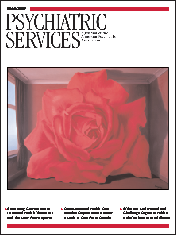To the Editor: An article in the October issue reported on the effectiveness of skills training to improve outcomes in supported employment (
1). Most readers will not go too far beyond the abstract and the conclusion that "supplementary skills training did not improve work outcomes." This overly simplistic message may be conveyed despite the authors' efforts to show that because of methodologic constraints the study did not disconfirm the hypothesis that skills training amplifies the effectiveness of supported employment.
The authors' detailed report of the study provides several reasons to consider training in workplace fundamentals as a promising supplement to supported employment. For example, among clients who received supplementary skills training, job tenure for the first job was 43 days longer on average, and the odds of working were 42 percent higher than for those who received supported employment alone. In addition, the percentage of clients working was 5 to 17 percent higher during 15 of the 18 months of the study. The moderate effect sizes of .21 or .23 were respectable, but the very small sample (a total of 35 clients) was not sufficient to yield significant differences. These effect sizes are in keeping with the intended value of training in workplace skills—namely, as a modest boost to job tenure for persons who are in supported employment.
As the authors point out, clients in both the experimental and control groups were uniquely gifted in terms of their sustained employment, enjoying job tenures that were two to three times as long as those of clients in previous studies of the same method of supported employment. Only three clients in the sample were fired from their jobs, a substantially lower rate than in other studies. All clients were already working when the study began, which suggests that they may have already acquired workplace skills, resulting in a "ceiling effect" that pre-empted any substantial, incremental benefit of the workplace fundamentals module. In addition, the fact that four of 17 clients assigned to the supplementary skills module did not attend any sessions suggests that participation in the module may have been suboptimal.
The knowledge test of information provided in the skills training module was designed to evaluate verbal learning of the salience and significance of the curriculum, not the work skills actually used on a job. Clients could very well have developed requisite workplace skills and problem-solving ability through implicit or procedural learning during previous jobs, which could help account for the high rate of sustained employment for all clients in the sample.
The authors' discussion of the limitations in the methods and results sections of this study is exemplary, pointing to the need for continued evaluation of the workplace fundamentals module with larger samples of individuals who are more disabled and who have less job experience. Future studies will add to these findings by answering the question, What treatment delivered by therapists with what competencies is better for which clients with what deficits and assets?

